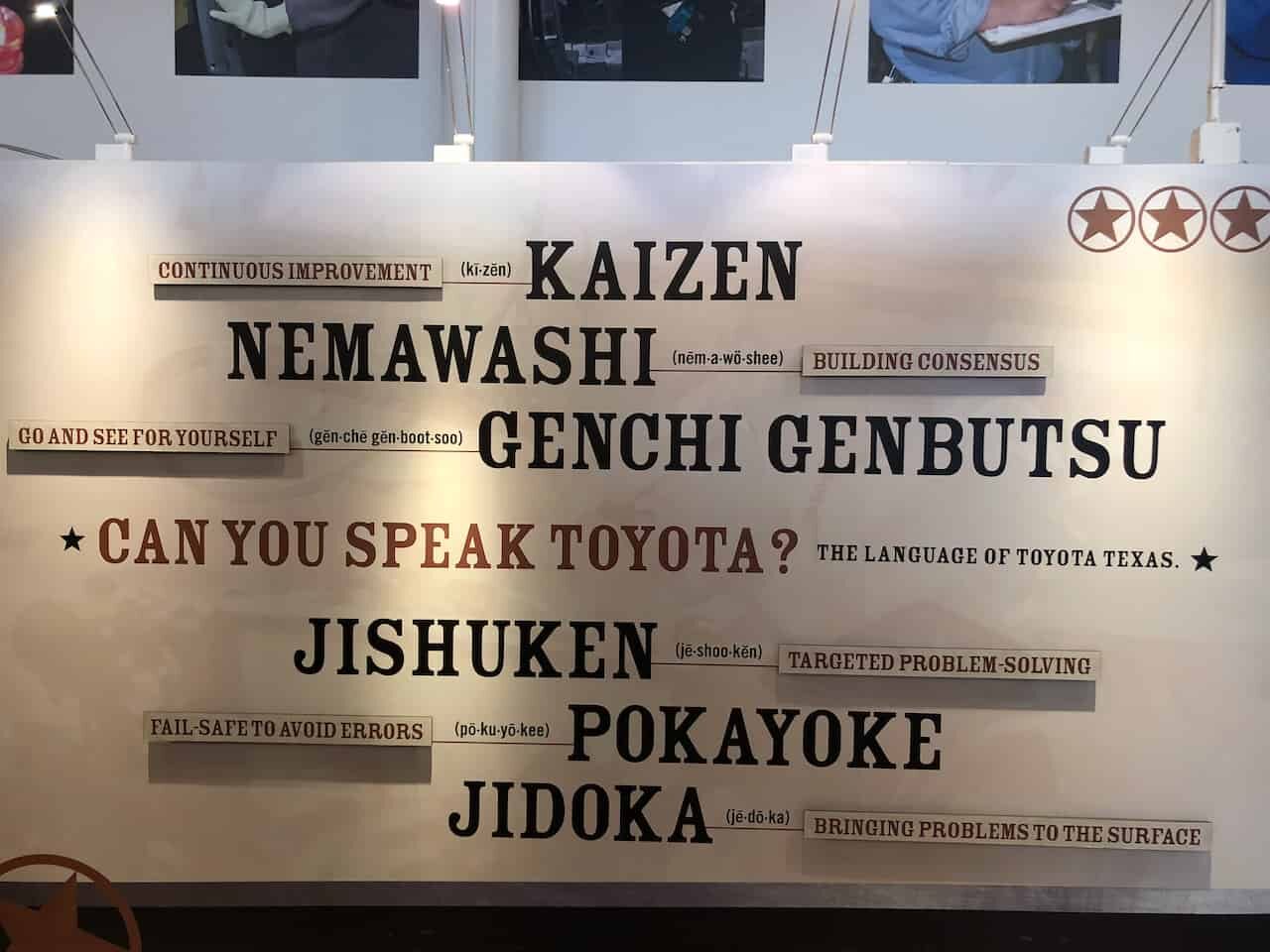I'll start the week with another post about my tour of the TMMTX (Toyota Motor Manufacturing Texas) plant in San Antonio. Today I'll write about the visitor center – other than having Toyota vehicles on display, what does the company emphasize with the general public? Not surprisingly, to this readership, there was a big focus on the Toyota Way and the Toyota Production System.
One of the concepts and phrases that visitors see is “Respect for People.” I was very glad to see that.
The first signs you see talk about Toyota's history and, of course, the Toyoda family's role – from the weaving loom to cars. Behind an old pickup truck is the phrase “70 years of continuous improvement.” The discussion of Sakichi Toyoda focuses on the core Toyota Way principle of “Respect for People” being a driver of continuous improvement (or “kaizen”).
A video describes the Toyota philosophy of “Never best, only better.”
Taiichi Ohno is featured as “the father of TPS” (without any mention of Shigeo Shingo, considered an equally important figure by many).
A large display board asks “Can you speak Toyota?” with some really well-known and more obscure Japanese words:
- Kaizen (continuous improvement)
- Nemawashi (building ideas through consensus)
- Genchi Genbutsu (go and see)
- Jishuken (targeted problem solving)
- Poka Yoke (mistake proofing)
- Jidoka (quality at the source)
The phonetic pronunciation surprised me, being listed as “poku yokee.”

Heijunka and Kanban were also emphasized in a separate wall discussing “just in time” production.
An interesting phrase that was used in the visitor center (and the tour) was to describe production workers as “industrial athletes,” with a big focus being placed on physical fitness. Employees are given access to an on-site gym and personal trainers to help prepare them for the physical work (for example, the potential strain of working overhead with tools). There seemed to be a very strong focus on ergonomics, in addition to safety. Many of the employee kaizen ideas were focused around ergonomic improvements.
One other display showed an exercise they use for testing hand-eye coordination and physical abilities of potential employees (wrapping a rope around a series of pegs coming out of the wall). There was some “standardized work” posted on the wall, but it went to show (even if this wasn't the point of the demonstration) that a document alone doesn't train people. I had nobody coaching me (and my hand/eye coordination isn't world class), so I struggled. It was an interesting example of some of the selection methods – looking for physical and personality traits (being able to do the work AND contribute to continuous improvement).
“Respect for people” was emphasized in terms of employes, suppliers (“Team Texas”), and the community (including an environmental focus). They are working to have TMMTX be a zero-landfill facility, including recycling steel scraps from stamping, etc.
I was surprised to see how much of the focus was on TPS. You'd think the general public just wants to know how cars are built (and the visitor center does explain stamping, paint, etc.). But it's apparently Toyota is proud of TPS as a core of who they are. I think the visitor center is proof of that.
I'll blog in future posts about their welcoming intro session and the plant itself.
Want to tour the plant? Click here.
Please scroll down (or click) to post a comment. Connect with me on LinkedIn.
Let’s work together to build a culture of continuous improvement and psychological safety. If you're a leader looking to create lasting change—not just projects—I help organizations:
- Engage people at all levels in sustainable improvement
- Shift from fear of mistakes to learning from them
- Apply Lean thinking in practical, people-centered ways
Interested in coaching or a keynote talk? Let’s start a conversation.









![When Was the Last Time a Leader Around You Admitted They Were Wrong? [Poll]](https://www.leanblog.org/wp-content/uploads/2025/07/Lean-Blog-Post-Cover-Image-2025-07-01T212509.843-100x75.jpg)
Nice overview, Mark. Sounds every bit as world class as we might believe. The link to “Preview Plant Tour” at Toyota’s site just gives a blank screen, though. Perhaps they’re having a technical issue? I’d REALLY like to see that!
Thanks for sharing this.
Mark – the page might appear blank because it requires flash and looks blank on an iPad or iPhone.
That said, on my full computer’s browser, there’s a video player… but an error message comes up when you try to play it (like the video file has gone missing).
The only “contact us” info (to give feedback about this) is a phone number: 210-263-4002
I was not surprised by the reference to “industrial athletes”. In a previous capacity I worked with employers on assessing the individual capacity of new employees to match the “task to the man”. This matching is even more important for assisting injured workers to return to work safely (and stay at work if/when appropriate, on modified work duties, safely). This approach has gone a long way with employers – particularly in manufacturing – to reducing workplace injuries and increasing the statisfaction of employees that have been injured in returning to full capacity in the workplace. Many employers have made it easier for employees to access treatment for injuries by having Physical Therapists periodically on-site or having other healthcare personnel available for “wellness” activities. Overall, most employers find it cost effective and in some cases the reduction in staff turn-over/retraining, etc. also more than pays for itself.
Unfortunately the volunteer guides at our local Toyota plant know a bit about making cars, but nothing about TPS/Lean/Kaizen and if you ask them they look blank, notwithstanding all the signs everywhere about it.
And by “local” you mean which part of the world?
Melbourne, Toyota’s plant at Altona that makes Camrys, including Hybrids.
At the Toyota plant here (I went again yesterday with a group), the tour guide was an hourly team member who used to work in the paint shop. He was pretty knowledgeable about the TPS concepts that they are taught and use in their daily work.
[…] Toyota Texas Tour – Concepts From the Visitor Center by Mark Graban – “I was surprised to see how much of the focus was on TPS. You’d think the general public just wants to know how cars are built (and the visitor center does explain stamping, paint, etc.). But it’s apparently Toyota is proud of TPS as a core of who they are.” […]
Ron – “task to the MAN”? Really, in this day and age?
ttsk, ttsk,… me bad. I recall that “fitting the task to the man” was the subtitle of a text I used about 15 years ago on the evaluation of occupational demands. Nevertheless, I accept the shame : )
Ron
[…] the San Antonio Toyota truck plant (otherwise known as TMMTX) back in 2010 (and I blogged about it here and here). I think I got sidetracked and I didn’t do more posts about the tour, as I had […]
[…] you actually get to the factory for the tour (after the visitor center introduction), you get a hard hat and safety glasses – safety first! You’re instructed […]